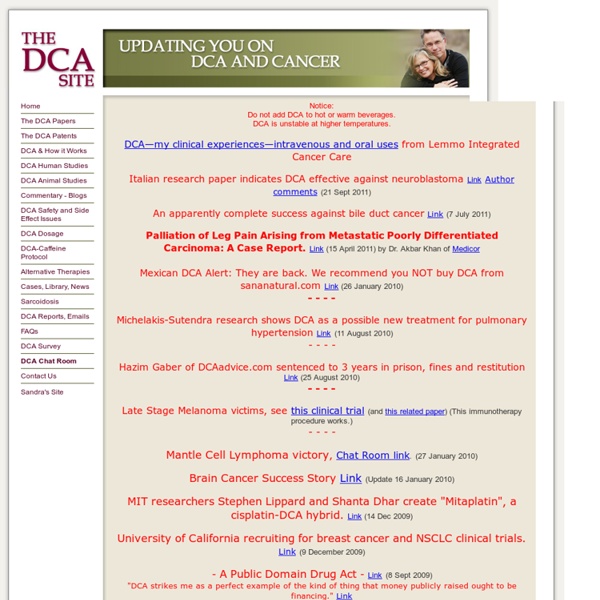



Dichloroacetate: University of Alberta Doctors Discover A Cure For Cancer UPDATE** View Clinical Trial Of DCA here Dr Evengelos Michelakis, associate chair and medical researcher at the University of Alberta’s faculty of medicine and his team of researchers have discovered a cure for cancer. Long after his work was published in the Journal of Clinical Investigation (JCI) (3)(4), Circulation (2002, 2006), Circulation Research (2004)(5), PNSAS (2007)(6)(7), and Science Translational Medicine (August 2010) (1)(2), the University of Alberta’s research team still isn’t receiving any support from the medical industry. Dr Michelakis and his team of researchers were the first to show that a cancer marker called survivin, which was thought to be found only in cancer cells was also heavily expressed in abnormal pulmonary arteries. The work was one of the first comprehensive studies to show a link between pulmonary arterial hypertension (PAH) and cancer, as you can see from the sources listed above. Why Is The Drug Not Being Used? Sources: Producing news is costly!
Proof That The Cancer Industry Doesn’t Want a Cure A safe and effective cure for cancer has been discovered with a drug that was once used for unusual metabolic problems. Yet, the cancer industry shows no interest with following up on dichloroacetate (DCA) research from University of Alberta in Edmonton, Canada, reported in 2007. That’s because DCA is no longer patented. (1) That research also confirmed cancer as a metabolic malfunction, not a weird mutation of cells often explained away as a genetic issue. But the medical mafia doesn’t want you to hear about it. Since Nixon declared the “war on cancer” in the 1970s, the cancer industry has succeeded with raising money for researching very expensive chemo substances at $50,000 to $100,000 per round or more for toxic therapies that rarely work. (2) Chemo drugs usually lead to demanding more business with drugs to ease terrible side effects ( DCA restores mitochondria in cells to make them function properly.
Dichloroacetate Cancer Treatment | How To Buy & Use Pure DCA Alerta en EEUU por el consumo de un producto antitumoral no autorizado para uso humano | elmundo.es salud Una de las páginas web que habla del DCA Actualizado viernes 30/03/2007 18:14 (CET) MADRID.- En enero de 2007, un grupo de científicos de la Universidad de Alberta (Canadá) publicó en la revista 'Cancer Cell' un estudio con ratones que demostraba la capacidad de una molécula experimental para reducir los tumores en estos animales. El producto en cuestión es el dicloroacetato (DCA), una pequeña molécula capaz de bloquear una enzima de la mitocondria, una pieza clave en el control del 'suicidio celular'. Sin embargo, la sustancia no puede patentarse porque existe desde hace años (y se emplea ya para el tratamiento de algún trastorno metabólico) y el doctor Michelakis no ha logrado encontrar una compañía farmacéutica interesada en financiar un ensayo clínico con humanos. Los autores alertan de los riesgos Imagen del estudio que muestra la acción del DCA sobre una célula maligna
Dicloroacetato de Sodio - Información ¿Es el dicloroacetato una cura contra el cáncer? | noticias de abajo Por la Dra. Mae-Wan Ho, 10 de abril de 2012 Dicloroacetato de sodio Una sustancia química común aparece como el último remedio milagroso contra el cáncer, pero las implicaciones en nuestra comprensión básica del cáncer pueden ser muy importantes, dice la Dra. Mae-Wan Ho. El dicloroacetato mata las células cancerosas y reduce los tumores El investigador del cáncer Evangelos Michelakis y su equipo de la Universidad de Alberta en Canadá alcanzaron en el año 2007 cierto renombre a raíz de la publicación de un estudio que afirmaba que un producto químico de uso común, el dicloroacetato (DCA) mataba las células cancerosas presentes en los cultivos sin afectar a las células normales e inhibiendo el crecimiento de los tumores cancerosos desarrollados en las ratas [1]. Desafortunadamente, no se han conocido ensayos clínicos realizados por las compañías farmacéuticas sobre el uso del dicloroacetato, una sustancia química de uso muy común que no puede ser patentada. Cómo funciona el dicloroacetato
A Phase I, Open-Labeled, Single-Arm, Dose Escalation, Clinical and Pharmacology Study of Dichloroacetate (DCA) in Patients With Recurrent and/or Metastatic Solid Tumours Primary Outcome Measures: To assess safety and tolerability of oral DCA [ Time Frame: Trial Completion ] [ Designated as safety issue: Yes ] To determine the dose-limiting toxicity (DLT) and phase II dose [ Time Frame: Trial completion ] [ Designated as safety issue: Yes ] To characterize pharmacokinetic (PK) profile [ Time Frame: Trial Completion ] [ Designated as safety issue: Yes ] Secondary Outcome Measures: To evaluate the effect of oral DCA [ Time Frame: Trial Completion ] [ Designated as safety issue: Yes ] To evaluate the clinical response rate [ Time Frame: Trial completion ] [ Designated as safety issue: Yes ] To evaluate the change in standard uptake value by FDG-PET scans before and after treatment with DCA [ Time Frame: Trial completion ] [ Designated as safety issue: Yes ] Intervention Details: Drug: Dichloroacetate Continuous daily oral dosage (bid).
Dichloroacetic acid Although preliminary studies have shown DCA can slow the growth of certain tumors in animal studies and in vitro studies, there is currently insufficient evidence to support the use of DCA for cancer treatment.[3] Chemistry and occurrence[edit] The chemistry of dichloroacetic acid is typical for halogenated organic acids. DCA has been shown to occur in nature in at least one seaweed, Asparagopsis taxiformis.[5] It is a trace product of the chlorination of drinking water and is produced by the metabolism of various chlorine-containing drugs or chemicals.[6] DCA is typically prepared by the reduction of trichloroacetic acid (TCA). Therapeutic uses[edit] Topical chemoablation[edit] Both DCA and TCA are used for cosmetic treatments (such as chemical peels and tattoo removal) and as topical medication for the chemoablation of warts, including genital warts. Lactic acidosis[edit] Cancer[edit] Neuropathy[edit] Heart failure[edit] See also[edit] Dalapon (dichloropropionic acid) References[edit]